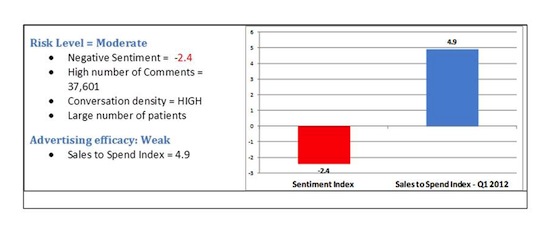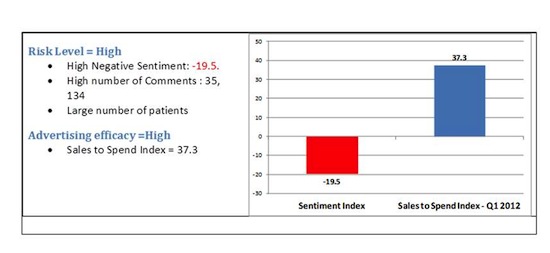Our series on the online reputations of the top 10 DTC-spending brands in Q1 2012 continues with a look at the erectile dysfunction (ED)-drug Cialis as well as the antipsychotic Abilify. If you need a refresher course of the study’s methodology or terminology click here, or feel free to take another look at Cymbalta or Lipitor before continuing on to the next two drugs in the study.
Cialis

Main Issues Contributing to Negative Sentiment
- Confusion as to how Cialis works as well as miscommunication between patients and physicians lead to a negative perception of the drug. While it is easy for patients to get prescriptions for ED drugs, patients do so with little conversation/discussion with their physicians about their medical problem or proper usage.
- Cialis is associated with side effects such as muscle aches, nasal congestion, headaches and rapid heartbeat.
- Cialis is also one of the drugs commonly ordered online and patients often discuss whether the product is “real.” Patients can also be more concerned about whether the “generic” product will work, rather than if it is dangerous. However, not all patients who purchase from an online pharmacy question the legitimacy of the product; some simply claim Cialis doesn’t work for them.
Main Aspects Contributing to Positive Sentiment
- Longer lasting and provides a longer window of opportunity than other ED drugs.
- Patients have found Cialis to be effective and with far fewer side effects than Viagra or Levitra.
- Cialis seems to be the medication of choice for men after prostate cancer treatment.
Main Areas of Risk
- Fake drugs cast a wider shadow on the efficacy of Cialis.
- The patients who are the most positive about Cialis like the product much better than Viagra and Levitra due to fewer side effects and longer lasting effects. However, Cialis too often gets considered simply interchangeable with the other ED drugs.
Abilify
Main Issues Contributing to Negative Sentiment
- Abilify can take weeks to be effective and, for some, does not seem effective at all.
- Side effects include sleeplessness, weight gain, increased blood pressure, hyperglycemia, akathisia and restlessness, increased anger, headache, agitation, anxiety, insomnia, nausea, upset stomach, sleepiness, lightheadedness, vomiting, tardive dyskinesia, and tremors. Also diabetes and PCOS (polycystic ovarian syndrome) is also reported.
- Side effects are severe enough for many patients to discontinue.
- Some patients feel that their physicians have prescribed Abilify without fully explaining why.
- Patients discontinue when they believe that the drug either doesn’t work or the benefits are overshadowed by the side effects.
- Many patients who take Abilify are on several drugs at once and struggle to know which of their medications is causing the most problems.
Main Issues Contributing to Positive Sentiment
- Mood stabilizing effects.
- Many patients feel that they have gained their lives back and attribute the changes to Abilify.
- Some nurses seem to prefer Geodon while patients express a preference for Abilify as Geodon makes them too tired.
Main Areas of Risk
- Physicians tend to mix medications in this category which makes it difficult at times to isolate the medication causing the most side effects and/or the one that is performing poorly.
- Patients seem to react either strongly positively or strongly negatively.
- Patients can live with some level of weight gain and other side effects but only if the product provides a high level of effectiveness.
Some Key Points To Overcoming Negative Sentiment
As negative sentiment is highly influenced by perceived side effects, we offer the following insights:
- Side effects alone are not a reason for complaint and discontinuation. Side effects without perceived benefit or in instances where the benefits do not outweigh the risks or areas of concern generate the most negative sentiment and perceptions.
- Setting expectations of potential side effects in a realistic and meaningful manner reduces negativity. Many physicians shy away from sharing side effect possibilities or setting expectations. However, prepared patients seem more able to cope with side effects.
- Patients read labels for side effect profiles but don’t always know how to interpret the ramifications of the risk vs. benefit decisions that they make. If their physicians downplay their side effect concerns, which unfortunately is common, then their anger increases and they direct that anger toward their therapy. They cannot control their physician, but they can control whether they follow his or her prescription.
- In communities where patient knowledge of the condition and treatment options is high, complaints are lessened by discussions with more knowledgeable patients. Patients who believe in the power of their treatments can be more convincing than the industry or physicians.
Take those pointers into consideration and then keep watch next month for our dissection of the online reputations of Celebrex and Humira.







